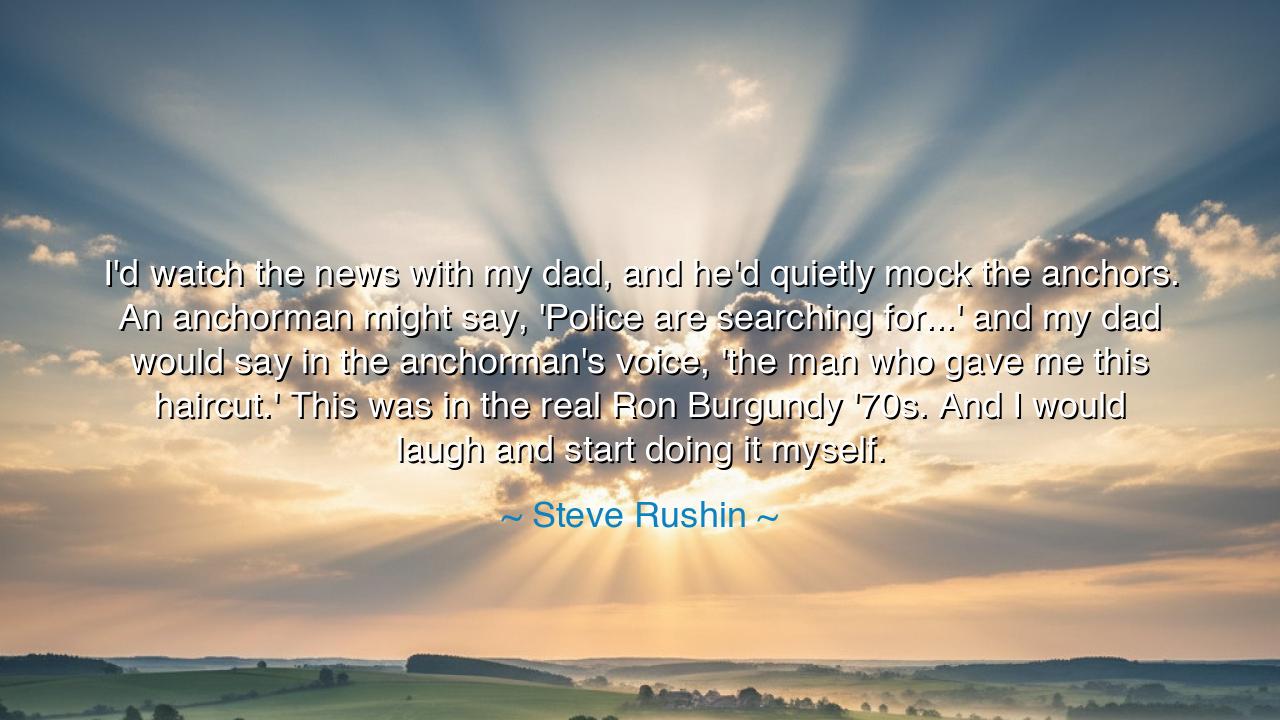
I'd watch the news with my dad, and he'd quietly mock the
I'd watch the news with my dad, and he'd quietly mock the anchors. An anchorman might say, 'Police are searching for...' and my dad would say in the anchorman's voice, 'the man who gave me this haircut.' This was in the real Ron Burgundy '70s. And I would laugh and start doing it myself.






In the warm and humorous words of Steve Rushin, we find more than the memory of laughter—we find the living heartbeat of legacy: “I'd watch the news with my dad, and he'd quietly mock the anchors. An anchorman might say, 'Police are searching for…' and my dad would say in the anchorman's voice, 'the man who gave me this haircut.' This was in the real Ron Burgundy '70s. And I would laugh and start doing it myself.” Beneath this playful recollection lies the timeless mystery of how love, humor, and identity flow silently from one generation to the next. It is a story of imitation, yes—but also of inheritance, of how the light of a parent’s spirit is passed like a torch, not through instruction, but through shared moments of joy.
The origin of this quote belongs to the memory of a boy who found wonder not in grand lessons, but in the ordinary ritual of watching television beside his father. It is set in the golden haze of the 1970s—an era of polyester suits and nightly news, of men like Ron Burgundy before the parody, when anchormen were the oracles of the modern home. But Rushin’s father, with quiet wit, saw through the pomp of authority and turned it into laughter. By mocking the anchor’s solemn tone, he taught his son not to bow to pretension, not to accept the world’s seriousness without question. And in that laughter, Steve Rushin discovered the first breath of his own voice—a voice that would later shape his career as a writer and humorist.
This small moment between father and son reminds us that wisdom does not always descend in solemn tones. Sometimes it arrives disguised as laughter. The ancients, too, understood this. Among the philosophers of Greece, Diogenes the Cynic mocked kings and scholars alike—not to insult them, but to unmask their illusions. His humor was his truth. So it was with Rushin’s father: by playfully mimicking the anchorman’s voice, he taught the subtle art of seeing the world with both reverence and irony. For laughter is not the enemy of truth—it is its companion, the fire that burns away false importance and leaves only what is real.
There is a story, ancient and luminous, of Socrates, who, when accused of corrupting the youth of Athens, replied with irony so disarming that even his judges were unsettled. His humor did not betray disrespect—it was his shield and his sword. Through it, he reminded the world that wisdom and humility are born together. Likewise, the laughter of Rushin’s father was no mockery of the world’s seriousness, but a gentle reminder that even authority must not take itself too seriously. In every generation, there are fathers and mothers who teach through such moments—who show their children that wit and warmth can walk hand in hand.
Humor, when pure, is an act of love. It bridges the chasm between generations and turns ordinary days into eternal memories. When Rushin, as a child, began to mimic his father’s mimicry, he was not merely learning to joke—he was learning connection, empathy, and courage. To laugh with another is to see the world through their eyes, if only for a breath. And when that laughter echoes down through time—from parent to child—it becomes a form of immortality. For long after a father’s voice is gone, his humor lingers like music, reminding the heart that love can be playful, too.
The lesson, then, is clear: never underestimate the power of small joys. A word spoken in jest, a smile shared over the mundane, a light moment in a dark world—these are not trivial things. They are the stones from which a life of meaning is built. When you share laughter with your children, your friends, or even a stranger, you are shaping their spirit in ways unseen. You are teaching them resilience, humility, and perspective—the ability to face life’s absurdities with grace.
So, beloved listener, take this teaching to heart: mock the world’s heaviness, but never its heart. Laugh at the pompous, not the pure; at the false, not the fragile. Use humor not to wound, but to reveal. Sit with those you love, as Rushin sat with his father, and find the divine in the simple. For it is in those moments—half-serious, half-silly—that life’s truest wisdom hides. And long after you are gone, may your laughter still echo in the hearts of those who come after, reminding them that joy, too, is a sacred inheritance.
Thus, in the simple jest of a father mocking the evening news, we glimpse eternity. The legacy of love is not always written in solemn words, but in shared laughter. For the laughter of the past becomes the courage of the present, and the wisdom of the future. And so, scatter humor like seeds into the hearts of those around you, that they too may bloom with joy when the world forgets to smile.






AAdministratorAdministrator
Welcome, honored guests. Please leave a comment, we will respond soon